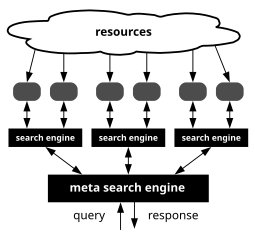Uses and Advantages of Meta Search Engines
– Researchers and students use meta search engines to access a wider range of sources for comprehensive information.
– Comparison shoppers use meta search engines to compare prices and features across different platforms, especially in industries like travel.
– Efficiency seekers save time by streamlining the search process with meta search engines that provide results from various sources on one page.
– Privacy-conscious users prefer meta search engines to reduce personal data collection and tracking by relying on multiple search engines.
– Web developers and SEO professionals use meta search engines to analyze website rankings and competitors’ online visibility.
– Meta search engines extend coverage by sending queries to multiple search engines, providing more information.
– Users save effort by avoiding the need to individually search on different engines for resources.
– Metasearching is useful for getting an overview of a topic or quick answers without comparing results from multiple engines.
– Metasearch engines can hide the searcher’s IP address, ensuring privacy.
– Some metasearch engines compile results without additional post-processing, while others rank results based on their own rules.
History of Meta Search Engines
– Daniel Dreilinger developed the first meta search engine called SearchSavvy, but it was not reliable due to limitations in search capabilities.
– Eric Selberg improved on SearchSavvy with MetaCrawler, which added search syntax and improved accuracy by querying 6 search engines.
– HotBot, known for fast results and searching within search results, experienced a decline in market share after being acquired by Lycos.
– Anvish and Solosearch were metasearch engines developed with neural networks for sorting search results.
– Ixquick, known for privacy policies, uses a unique ranking system based on stars to indicate agreement among search engines.
Disadvantages of Meta Search Engines
– Metasearch engines may not fully parse query forms or translate query syntax.
– The number of hyperlinks generated by metasearch engines is limited, potentially missing complete results.
– Most metasearch engines prioritize pay-per-click links and do not interact with larger search engines.
– Metasearching can lead to duplicate results and give the illusion of more coverage, especially for popular information.
– Advanced search syntax may not be supported, resulting in less precise results compared to specific search engine interfaces.
Operation of Meta Search Engines
– A metasearch engine accepts a single search request from the user and passes it to other search engines’ databases.
– Metasearch engines do not create their own database but generate a federated database system from multiple sources.
– Duplicates are generated due to different algorithms in search engines, so metasearch engines apply their own algorithm to remove duplicates.
– The revised list of results is then provided to the user.
– Search engines can cooperate, behave non-cooperatively, or be hostile when contacted by a metasearch engine.
Architecture of Ranking, Fusion, Spamdexing, and Content Spam
– Highly ranked web pages are more likely to provide useful information.
– Different search engines have different ranking scores for each website.
– Metasearch engines rely on consistent ranking data to generate reliable accounts.
– Websites can be highly ranked on one search engine and lowly ranked on another.
– Inconsistent ranking data can affect the reliability of metasearch engines.
– Metasearch engines use fusion to filter data for efficient results.
– Collection Fusion is used for search engines that index unrelated data.
– Collection Fusion ranks data based on its relevance to the query.
– Data Fusion deals with information from search engines that index common data sets.
– Data Fusion merges rank scores and selects data with high relevancy.
– Spamdexing is the deliberate manipulation of search engine indexes.
– It manipulates the relevance or prominence of indexed resources.
– Spamdexing leads to poor precision in search engine results.
– Search engine algorithms are made complex to tackle Spamdexing.
– Spamdexing affects the natural ranking system of search engines.
– Content spam techniques alter the logical view of a page for search engines.
– Keyword stuffing increases keyword count and density on a page.
– Hidden/invisible text disguises unrelated text using various methods.
– Content spam can trick search engines and affect rankings.
See also
– Federated search
– List of metasearch engines
– Metabrowsing
– Multisearch
– Search aggregator
A metasearch engine (or search aggregator) is an online information retrieval tool that uses the data of a web search engine to produce its own results. Metasearch engines take input from a user and immediately query search engines for results. Sufficient data is gathered, ranked, and presented to the users.

Problems such as spamming reduces the accuracy and precision of results. The process of fusion aims to improve the engineering of a metasearch engine.
Examples of metasearch engines include Skyscanner and Kayak.com, which aggregate search results of online travel agencies and provider websites and Searx, a free and open-source search engine which aggregates results from internet search engines.
1912 NW 143rd Ave #24,
Portland, OR 97229, USA